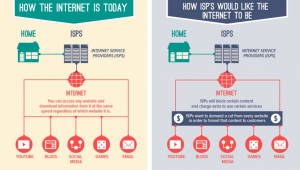The vote is tomorrow!
How Net Neutrality is on the line
December 13, 2017
The way you use the internet is currently in crisis. On December 14, the FCC will vote whether or not to get rid of Net Neutrality. A vote making such a big impact in our everyday lives isn’t getting as much attention, as it should.
Net Neutrality preserves the right to communicate freely through the internet. Just as your phone company shouldn’t decide who you call and what you say on that call, your ISP doesn’t interfere with the content you view or post online. Without Net Neutrality, cable and phone companies could make the internet into fast and slow lanes. An ISP could slow down its competitors’ content or block political opinions it disagrees with. ISPs could charge extra fees to the few content companies such as Twitter, Instagram, etc.
Not only is the right to open internet in jeopardy but also has forms of classism. With the internet becoming more expensive and limited access, those living checks by checks won’t have the same access as those with higher pay. With Net Neutrality, everyone pays the same prices and have unlimited access. 
FCC Chairman Ajit Pai proposed the idea of taking away Net Neutrality. In May, the FCC voted to let Pai’s internet-killing plan move forward. By the end of the summer, the agency was flooded with more than 20 million comments. The vast majority of people commenting urged the FCC to preserve the existing Net Neutrality rules. Pai’s plan will require companies such as Comcast and Verizon to disclose to their users whether they plan to block or slow down certain sites, and the FCC will be tasked with overseeing their transparency.
Many have voiced their opinions on Net Neutrality by hosting protests, signing petitions, and using social media platforms to bring awareness. Celebrities such as Cher are also using their influence to help the cause. “Trump can Change The Internet 

Whether you agree or disagree with Net Neutrality, it’ll definitely transform how technology impacts our everyday lives.


